Advertisements
Advertisements
प्रश्न
Work in pairs and recognise how many words belong to each set. Complete the sentences as in the example. Use words only from the box above:

- Chemical elements?
Mercury, iron, ammonia__________ of___________ are chemical elements. - Countries in South America?
Brazil, Syria, Sumatra One____________ is a country in South America. - Rivers?
Hwang Ho, Mekong ____________ them are rivers. - Languages?
Telugu, Bengali, Punjabi, Holland____________are languages. - Capital cities?
Pokhara, Mandalay, New York, Melbourne___________of ____________a capital. - Grow on trees?
Pineapple, tomato_______________ of them grows on trees. - Religions?
Taoism, Democracy, Communism ____________of ____________ is a religion. - Units of currency?
rupee, kyat, yen, dollar, baht, rupiah ____________are units of currency.
उत्तर
- Mercury, iron—Two of them are chemical elements.
- Brazil—One of them is a country in South America.
- Hwang Ho, Mekong—Both of them are rivers.
- Telugu, Bengali, Punjabi—Three of them are languages.
- Mandalay—One of them is a capital city.
- Pineapple—Neither of them grows on trees.
- Taoism—One of them is a religion.
- rupee, kyat, yean dolloar, baht, rupiah—All of them are units of currency.
APPEARS IN
संबंधित प्रश्न
Answer the following question briefly:
What were the Professor’s ambitions in the army?
On the basis of your understanding of the poem, answer the following questions
by ticking the correct choice.
The poet draws a parallelism between the journey of the brook with ___________.
Fill in the blanks to complete the following paragraph that highlights the theme of
the poem. Use the words given in the box below.
decision sorry foresee choices pleasant direction
fork trail rewarding chance wonder both
The poem "The Road Not Taken" by Robert Frost is about the __________ that one
makes in life. It tells about a man who comes to a ___________ in the road he is
travelling upon. He feels ___________ that he can not travel___________ paths as he
must choose one. Frost uses this fork in the road to represent a point in the man's life
where he has to choose the ___________ he wishes to take in life. As he thinks about
his ___________ he looks down one path, as far as he can see trying to ___________
what life will be like if he walks that path. He then gazes at the other and decides that the
outcome of going down that path would be just as ________________. At this point he
concludes that the ________that has been less travelled on would be more
___________ when he reaches the end of it. The man then decides that he will save the
other path for another day, even though he knows that one path leads to another and
that he won't get a ___________ to go back. The man then says that he will be telling
this story with a sigh, someday in the future suggesting that he will ___________ what
life would have been like if he had chosen the more walked path even though the path
he chose has made all the difference.
Answer the following question.
Give an appropriate proverb that conveys the message that this poem carries.
Answer the following question briefly.
Do you think the Bishop was right in selling the salt-cellars? Why/ Why not?
Rearrange the following words and phrases to form meaningful sentences. The first one has been done as an example:
other species/ human species/the/of/ many/ the/ very existence/ is threatening.
The human species is threatening the very existence of many other species.
(a) of nature/biodiversity/the/is/variety of life forms/interact to support/ that/ and sustain/ balance/ the ____________________________________
(b) consumed/as/grows,/ more and more of / Earth’s/ the / resources/ are/ human population/the
____________________________________
(c) extinction/ crisis / explosive/ an/ consumption / had led / growth and / an ____________________________________
(d) that have/ Earth’s history/ mass extinctions / the/ threatens/ periodically during/ occurred/ the/and to surpass
(e) one everyday/ scientists/ that/ estimate/ rate off species are disappearing/ the / at
____________________________________
As a resident of Kanpur, write a formal letter to the Editor of a prominent newspaper highlighting the problem discussed in Question 2. Also give some suggestions on how this problem can be reduced.
|
FORMAL LETTER A-43 Civil lines |
In each sentence four words are underlined. One of them is incorrect. Pick out the incorrect words and write them in the answer space against the correct number:
- Music therapy use music to improve the patient’s health.
_______________________________ - It is used with individuals of all ages.
_______________________________ - It helps in curing a variety of medical problems as substance abuse and aging.
_______________________________ - It is also used to improve learning and reduces stress,
_______________________________
Look at the pictures of people talking to each other. With your partners, discuss what they are telling each other. Share your ideas with the class.
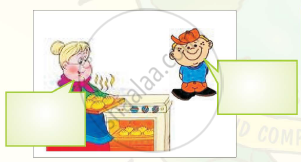
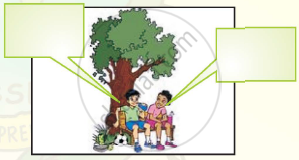
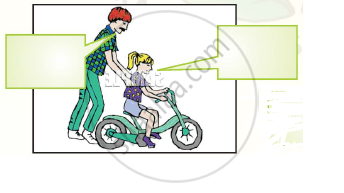
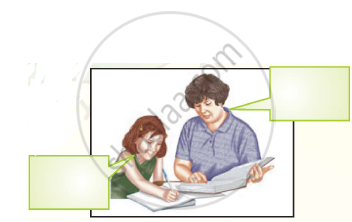
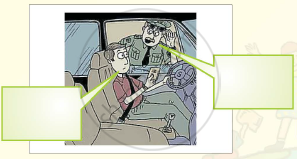
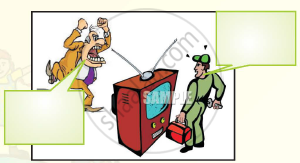
Below is a description of Geothermal Energy. Complete the passage by filling in the gaps choosing the correct option from the given options. The first one has been done for you.
In volcanic areas, underground water (a) can often rise to a temperature of 200° C. Nowadays, wells (b) __________ drilled to extract the steam which is used to drive turbines. This is (c) __________ of the world’s fastest growing sources of energy. (d) __________ the water is heated by enormous reservoirs of cooling rock several kilometers across, geothermal steam is (e) __________ to be a renewable energy resource. Even in non- volcanic areas, underground water can (f) __________ heated by natural radioactivity. In this case, (g) __________, it is necessary to drill deeper before the water is as hot as 200° C. This method (h) __________ used for heating homes in certain areas for many years and is cheap, clean and efficient.
| (a) (i) could (ii) can (iii) must (iv) might |
(b) (i) is (ii) been (iii) are (iv) being |
(c) (i) any (ii) some (iii) one (iv) few |
(d) (i) As (ii) While (iii) Though (iv) Even |
| (e) (i) called (ii) said (iii) regarded (iv) told |
(f) (i) be (ii) been (iii) being (iv) is |
(g) (i) however (ii) though (iii) despite (iv) therefore |
(h) (i) being (ii) was (iii) be (iv) has been |
